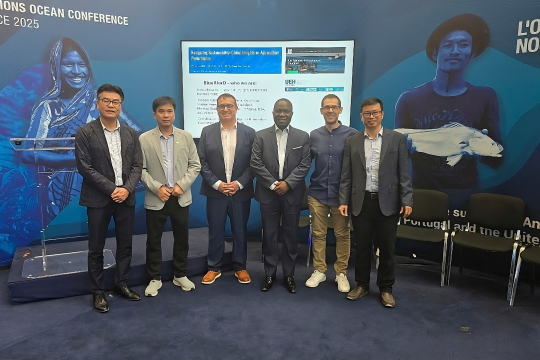EfD’s Blue Resources for Development, BlueRforD, program took the stage at the 2025 UN Ocean Conference (UNOC3), in the thematic session “Navigating sustainability: Global insights on aquaculture performance.” The BlueRforD’s researchers demonstrated that aquaculture can harmonize economic growth with environmental protection and social responsibility, provided that it is supported by accurate data and inclusive management, using case studies from Africa, Asia, and Latin America.
BlueRforD is a collaborative program within EfD, coordinated by EfD Vietnam. Its network includes researchers from various countries, and aims to provide science-based tools to assess and improve aquaculture in low- and middle-income settings.
Pham Khanh Nam, EfD Vietnam, served as the session’s chair and opened with an introduction to the EfD network and the BlueRforD initiative.
Carlos Chávez, EfD Chile, then explained the Aquaculture Performance Indicators (APIs) – a tool designed to measure sustainability across environmental, economic, and social dimensions.
Four countries, four aquaculture stories
Wisdom Akpalu, EfD Ghana, compared tilapia farming systems in Ghana and Nigeria. While aquaculture has rapidly expanded and improved local diets and incomes, the industry faces threats from pollution, poor regulation, and expensive inputs. Policy recommendations included stronger institutions, environmental monitoring, and support for small producers.
Jorge Marco Renau, EfD Colombia, highlighted differences between the domestic and export tilapia sectors. Exporters outperformed in economic and community dimensions, though both faced similar environmental challenges. Issues such as land tenure, gender equity, and weak data systems were flagged as areas for reform.
Ho Quoc Thong, EfD Vietnam, presented Vietnam’s shrimp farming industry. Results showed strong post-harvest performance but lingering concerns over water pollution and the quality of mangrove degradation, though the area of mangrove forest has been significantly recovered. Climate-related disease risks also raise questions about long-term resilience.
Carlos Chávez returned to present Chile’s aquaculture performance. It performed well overall, on all three APIs, especially in social and environmental terms. However, low certification rates and market access constraints limit its potential. The study suggests targeted investments in value chains and improved farm management practices.
Future directions for sustainable aquaculture
Following the presentations, a moderated panel and audience Q&A session engaged experts in discussing the trade-offs and opportunities in aquaculture development. They highlighted the importance of science-based decision-making, inclusive governance, and improved access to technology and training for small-scale farmers.
Looking ahead, the BlueRforD team emphasized the significance of comparative research and affordable assessment tools such as the API. As challenges like climate change, diseases, and market fluctuations become increasingly complex, collaborative efforts are crucial to building blue food systems that are sustainable, inclusive, and resilient.
By Thong Ho and Nhan Le
